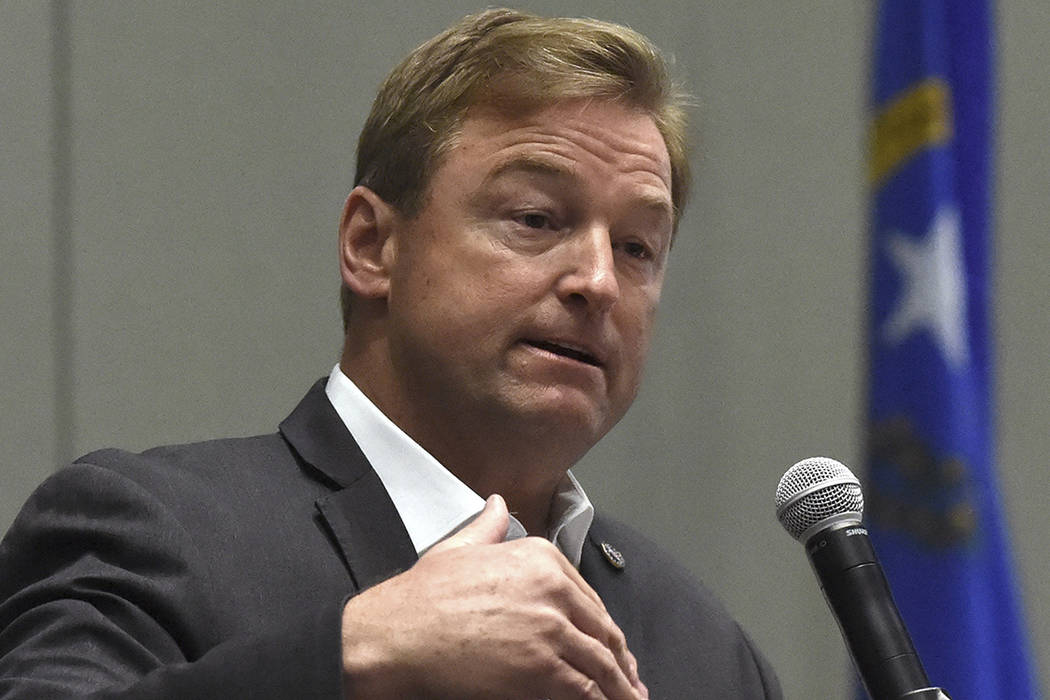Heller, other GOP senators urge 7-year phaseout of Medicaid expansion
WASHINGTON — Republican senators from states that expanded Medicaid support a slow phaseout of that expansion — an issue at the center of negotiations as lawmakers scramble to write compromise legislation to repeal and replace Obamacare.
Sens. Dean Heller, R-Nev., Rob Portman, R-Ohio, and Shelley Moore Capito, R-W.Va., support a seven-year phaseout of Medicaid expansion, which would end federal funding and likely force states to slash coverage for thousands of poor adults.
Conservatives lawmakers like Sens. Ted Cruz, R-Texas, and Rand Paul, R-Ky., have called for a complete repeal of the Medicaid expansion that resulted in coverage for 11 million people.
And compromise talks in the Senate have included a quick phaseout of Medicaid expansion of three to five years, and keeping current mandates that require insurance carriers to provide plans for people with pre-existing conditions.
A House bill calls for ending the expansion in two years.
Lawmakers from states that expanded the Medicaid program are concerned that costs will shift entirely to the states, prompting some to drop coverage for those who enrolled during the expansion.
Heller said eliminating the Medicaid expansion immediately would create a $250 million shortfall in Nevada’s state budget and eliminate coverage for more than 200,000 people who received coverage under Medicaid expansion.
Still, Heller told reporters earlier this week he supports a proposal by Portman that would slow the termination of the program. His comments were first reported in The Hill, a Washington publication.
A Heller spokeswoman said the phaseout is one of several policy options under consideration to ensure “the rug is not pulled from Nevadans” who received coverage for the first time under the expansion.
Nonetheless, the Center on Budget and Policy Priorities, a nonpartisan research group, said the result would be the same.
“That approach would not preserve anyone’s coverage in the long run. It would also do next to nothing to preserve Medicaid expansion in the short run,” said Aviva Aron-Dine, a senior fellow with the CBPP.
The CBPP issued an analysis this week of the House health care bill.
Delaying the termination would not change the effects, Aviva Aron-Dine said.
“States would still have to end their expanded Medicaid programs because of the large cost shift from losing federal funds, and the poor and the near-poor adults losing Medicaid wouldn’t be able to afford private coverage,” she said.
Republicans have vowed to repeal the Affordable Care Act, commonly called Obamacare, since it was passed in Congress in 2010 without a single GOP vote.
Likewise, Democrats are united in their opposition to Republican replacement plans that will cut coverage.
The Congressional Budget Office found the repeal legislation passed by the House last month would increase the number of uninsured by 23 million people but reduce federal deficits by $119 billion over 10 years.
Senate Republican leaders criticized the House bill as too draconian. GOP lawmakers are scrambling to write their own version of the legislation.
But the bill faces political hurdles in the Senate where Republicans hold a slim 52-48 majority.
Senate Majority Leader Mitch McConnell has formed a working group to write consensus legislation that can pass with just GOP support. Republicans can afford to lose only a couple of votes to move the legislation.
A vote could come before the July 4 recess.
Heller is considered the most vulnerable Republican in the Senate in 2018. Nevada voted for Hillary Clinton in the 2016 presidential election, and elected Democrats for U.S. Senate and three of four House seats.
The Democratic Senatorial Campaign Committee and numerous advocacy groups have criticized Heller with targeted advertising over his his vow to repeal Obamacare.
A tracking poll by the Kaiser Family Foundation found that 55 percent of the public hold an unfavorable view of the House health care bill and the same percentage of respondents want the Senate to make major changes, or not pass it at all.
The poll was conducted May 16-22 with a survey sample of 1,205 adults, interviewed in English and Spanish. The poll has a margin of error of plus or minus 3 percentage points.
Contact Gary Martin at 202-662-7390 or gmartin@reviewjournal.com. Follow @garymartindc on Twitter.
Poll results
A tracking poll by the Kaiser Family Foundation found that 55 percent of the public hold an unfavorable view of the House health care bill passed in May and the same percentage of respondents want the Senate to make major changes, or not pass it at all.
The poll was conducted May 16-22 with a survey sample of 1,205 adults, interviewed in English and Spanish. The poll has a margin of error of plus or minus 3 percentage points.




























